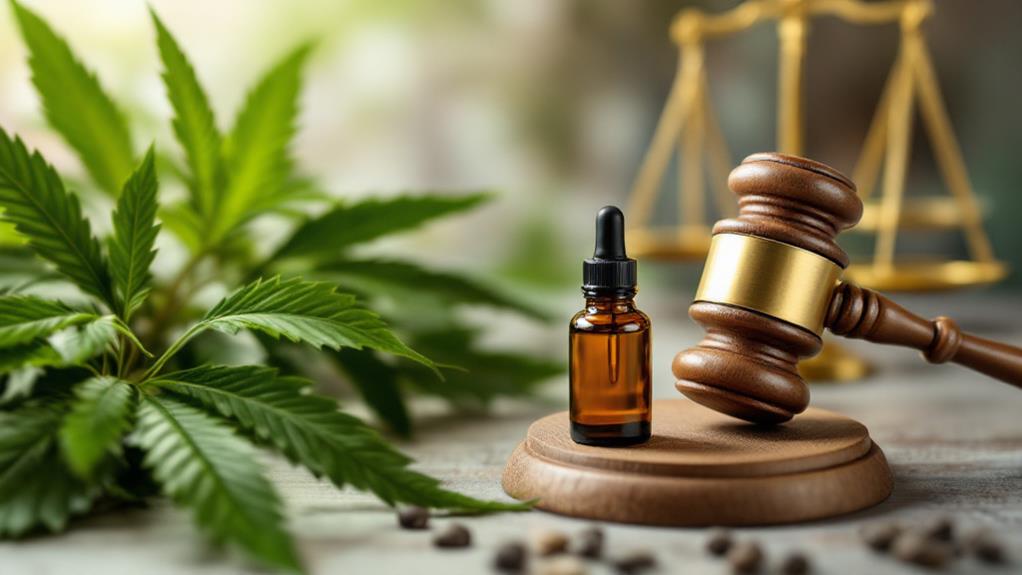Benefits of CBD Oil: What You Need to Know

CBD oil offers a range of potential health benefits you might find intriguing. It's been recognized for reducing anxiety, improving sleep, and even offering some relief from chronic pain and inflammation. The FDA has approved CBD for certain seizure disorders, showcasing its neuroprotective properties. There's also potential for alleviating cancer treatment symptoms like nausea and pain. While many studies are preliminary, they highlight CBD's promise in supporting mental health and possibly aiding in heart health by reducing blood pressure. To fully grasp its impact and nuances, further exploration into these findings is worthwhile.
Health Benefits Overview
In recent years, CBD oil has gained attention for its potential health benefits, drawing from a rich history of use in traditional medicine. You might be intrigued to learn about its diverse advantages. Research has shown that CBD can impact your health positively by potentially reducing symptoms of anxiety and depression. A 2020 literature review highlighted its mood-enhancing properties, although more research is needed to make formal recommendations. This means CBD could be a valuable tool in managing these mental health conditions.
Furthermore, CBD oil is known for its neuroprotective properties, which may offer benefits for conditions like epilepsy. In fact, the FDA has approved Epidiolex, a CBD-based medication, for certain seizure disorders. This underscores CBD's potential in supporting neurological health.
Additionally, if you're struggling with sleep quality, preliminary studies suggest CBD might help improve it and manage insomnia, giving you a restful night's sleep. As you investigate these benefits, it's crucial to recognize that further research is necessary to fully understand CBD's role in health. However, its potential is promising, making it a compelling option for those seeking natural health solutions.
Pain Management
In the domain of managing pain, CBD oil might just be a game-changer. Historically, it's been used since 2900 B.C. in Chinese medicine to alleviate pain. Today, preclinical studies suggest that CBD interacts with endocannabinoid receptors, potentially reducing chronic pain and inflammation linked to health conditions like fibromyalgia. This ancient remedy is gaining modern interest, with a 2020 literature review highlighting its effectiveness in easing pain sensations, although more clinical trials are needed for conclusive evidence.
Anecdotal reports from users experiencing relief from joint pain and arthritis suggest that CBD's anti-inflammatory properties play a significant role in pain management. While human studies on CBD's effectiveness for pain are limited, ongoing research aims to validate its potential in pain relief strategies. Here's what you might find about CBD and pain management:
- Historical Use: Used for pain relief since ancient times in different cultures.
- Preclinical Studies: Suggest interaction with receptors to reduce pain.
- Anecdotal Evidence: Users report relief from chronic pain and inflammation.
- Research and Trials: More are needed to confirm CBD's role in managing pain.
Incorporating CBD into your pain management routine might offer the relief you're seeking.
Mental Health Support

While CBD oil's potential in pain management captures attention, its role in mental health support is likewise compelling. If you're grappling with anxiety or depression, CBD might offer some relief. A 2020 literature review highlights studies showing CBD's mood-enhancing properties, making it a promising option for those dealing with these common mental health challenges.
In conjunction with anxiety and depression, CBD shows promise in addressing PTSD symptoms. A small 2019 study found it effective in reducing nightmares associated with PTSD, indicating its potential usefulness in trauma-related conditions. However, it's crucial to recognize that while preclinical evidence supports CBD's effectiveness in treating numerous anxiety disorders, most of these results come from animal studies. More human research is needed to fully understand its impact.
Despite the need for further investigation, the World Health Organization (WHO) recognizes that CBD exhibits no abuse or dependence potential, making it a safe alternative without the risk of addiction. Although CBD isn't formally recommended for mental health treatment due to insufficient research, ongoing studies are exploring its efficacy across supplementary mental health disorders, offering hope for broader applications in the future.
Cancer Symptom Relief
CBD oil offers potential benefits for cancer symptom relief, particularly in alleviating nausea, vomiting, and pain. Research from 2022 suggests that CBD may help manage these challenging symptoms, often associated with cancer and its treatment. Chemotherapy, while vital, can lead to severe discomfort, and CBD might offer a complementary option to improve patient comfort during treatment. Some studies have shown that patients report subjective improvements in their quality of life when using CBD alongside traditional cancer therapies.
Despite these promising insights, the research on CBD's effectiveness in cancer symptom management is still emerging. Findings are mixed, which highlights the need for more thorough studies to reach consistent outcomes. However, ongoing investigations continue to investigate the safety and effectiveness of using CBD regularly in cancer care.
Here's what you need to know about CBD and cancer symptom relief:
- Potential to alleviate nausea and vomiting from chemotherapy
- May reduce pain associated with cancer treatments
- Could improve overall quality of life for patients
- Ongoing research is vital to understanding its full potential
While CBD shows promise, it's significant to consult with healthcare professionals before incorporating it into your treatment plan.
Neuroprotective Effects

Many studies highlight CBD's potential neuroprotective effects, especially in neurological conditions like multiple sclerosis (MS). In MS, where pain and spasticity are common challenges, CBD has emerged as a promising aid. Research indicates that nabiximols, a combination of CBD and THC, can notably reduce these symptoms, offering relief for individuals with MS. The FDA's approval of Epidiolex, a CBD-based medication for seizures linked to certain epilepsy disorders, underscores CBD's therapeutic potential in treating neurological conditions.
Beyond MS, CBD shows promise in addressing other neurodegenerative diseases like Parkinson's and Alzheimer's. Although evidence is still preliminary, its antioxidant properties suggest that CBD might protect neurons from damage, which is vital for preventing or slowing down the progression of such disorders. This aspect of CBD is especially significant, considering the ongoing research focused on exploring its broader applications.
However, while the potential is there, more clinical trials are necessary to firmly establish CBD's efficacy and safety in these areas. The excitement around CBD's neuroprotective effects continues to grow, fueling further studies to validate its role in managing diverse neurological conditions.
Cardiovascular Health
In recent years, interest in CBD's impact on cardiovascular health has surged, driven by its potential to influence heart contractions and improve blood vessel function. One intriguing finding comes from a 2020 study, which showed that a single dose of 600 mg of CBD reduced blood pressure in healthy men. This suggests that CBD might play a role in improving cardiovascular function. Since high blood pressure is a major risk factor for heart disease and stroke, the potential of CBD to lower blood pressure could contribute appreciably to heart health.
While these initial findings are promising, they also highlight the need for more extensive research. The effects of CBD on blood pressure were observed to wane after seven days, indicating that sustained benefits might require further exploration.
Here are some key points to reflect on:
- CBD may help with heart contractions and blood vessel function.
- A 2020 study showed CBD reduced blood pressure in healthy men.
- Long-term effects of CBD on blood pressure need more human studies.
- CBD's potential in heart disease prevention requires further research.
As research continues, understanding CBD's role in heart health could lead to more effective treatments for cardiovascular issues.
Legal Considerations

Maneuvering the legal landscape of CBD can be challenging due to its complex regulations. In the United States, the 2018 Farm Bill made hemp-derived CBD legal at the federal level, provided it contains less than 0.3% THC. However, state laws can impose supplementary restrictions, meaning the legal status of CBD can vary considerably depending on where you are. This variance requires you to verify local laws before purchasing or traveling with CBD products.
Cannabis-derived CBD presents even more complications, as it remains illegal federally. This difference in legality can affect the availability and use of CBD in different regions, so it's essential to stay informed.
Nonprescription CBD products aren't regulated by the FDA, which can lead to mislabeling and concerns about product quality. You should be cautious and do your research to verify you're getting a safe and effective product. The FDA is exploring regulations for CBD, focusing on safety and efficacy claims, so changes in the legal landscape could occur.
Understanding these legal nuances helps you navigate the CBD market more confidently, guaranteeing compliance and safety in your CBD use. Always stay updated on evolving laws and regulations to make informed decisions.
Choosing Quality Products
Selecting high-quality CBD oil is crucial for guaranteeing both safety and effectiveness. When you're choosing CBD products, prioritize those that have undergone third-party lab testing. This step confirms the safety and purity of the product, verifying the cannabinoid content is accurately labeled. Opt for full-spectrum or broad-spectrum CBD oils as they harness a range of cannabinoids and terpenes, improving effectiveness through the entourage effect. To comply with federal regulations, confirm that the CBD oil is sourced from hemp plants containing less than 0.3% THC. This guarantees minimal psychoactive effects.
Transparency is key. Look for products with clear ingredient transparency, steering clear of artificial additives or fillers that might compromise quality. Before making a purchase, investigate user reviews and ratings. They'll give you insights into the product's effectiveness and the company's reputation. Remember, informed choices lead to better experiences with CBD.
Here's a quick checklist to guide you:
- Verify third-party lab testing for safety and purity.
- Choose full-spectrum or broad-spectrum oils for improved effects.
- Confirm the hemp source for less than 0.3% THC.
- Check for ingredient transparency and read user reviews.




